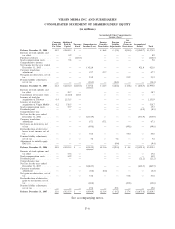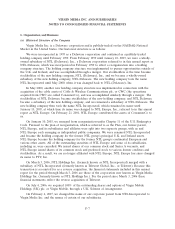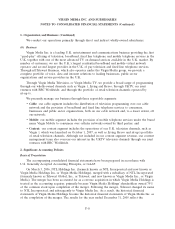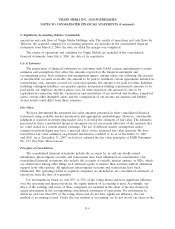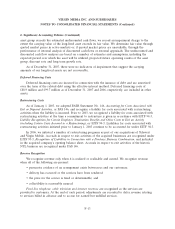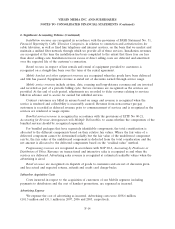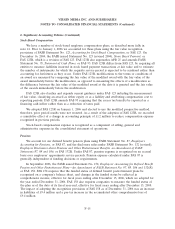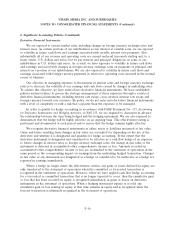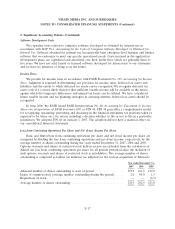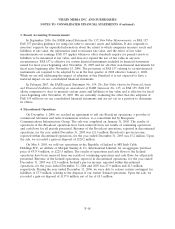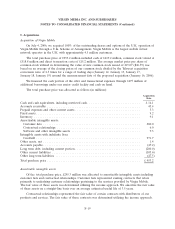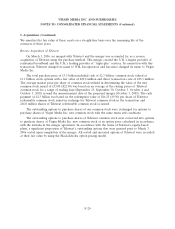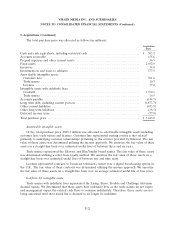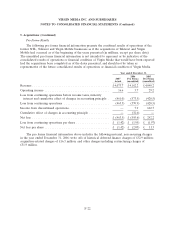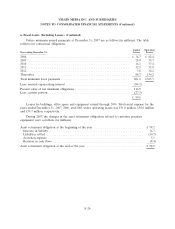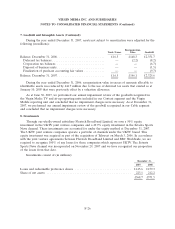Virgin Media 2007 Annual Report Download - page 102
Download and view the complete annual report
Please find page 102 of the 2007 Virgin Media annual report below. You can navigate through the pages in the report by either clicking on the pages listed below, or by using the keyword search tool below to find specific information within the annual report.VIRGIN MEDIA INC. AND SUBSIDIARIES
NOTES TO CONSOLIDATED FINANCIAL STATEMENTS (Continued)
2. Significant Accounting Policies (Continued)
Derivative Financial Instruments
We are exposed to various market risks, including changes in foreign currency exchange rates and
interest rates. As certain portions of our indebtedness accrue interest at variable rates, we are exposed
to volatility in future cash flows and earnings associated with variable interest rate payments. Also,
substantially all of our revenue and operating costs are earned and paid in pounds sterling and, to a
lesser extent, U.S. dollars and euros, but we pay interest and principal obligations on some of our
indebtedness in U.S. dollars and euros. As a result, we have exposure to volatility in future cash flows
and earnings associated with changes in foreign currency exchange rates on payments of principal and
interest on a portion of our indebtedness. We are also exposed to volatility in future cash flows and
earnings associated with foreign currency payments in relation to operating costs incurred in the normal
course of business.
Our objective in managing exposure to fluctuations in interest rates and foreign currency exchange
rates is to decrease the volatility of our earnings and cash flows caused by changes in underlying rates.
To achieve this objective, we have entered into derivative financial instruments. We have established
policies and procedures to govern the strategic management of these exposures through a variety of
derivative financial instruments, including interest rate swaps, cross-currency interest rate swaps and
foreign currency forward rate contracts. By policy, we do not enter into derivative financial instruments
with a level of complexity or with a risk that is greater than the exposure to be managed.
In order to qualify for hedge accounting in accordance with FASB Statement No. 133, Accounting
for Derivative Instruments and Hedging Activities, or FAS 133, we are required to document in advance
the relationship between the item being hedged and the hedging instrument. We are also required to
demonstrate that the hedge will be highly effective on an ongoing basis. This effectiveness testing is
performed and documented at each period end to ensure that the hedge remains highly effective.
We recognize derivative financial instruments as either assets or liabilities measured at fair value.
Gains and losses resulting from changes in fair value are accounted for depending on the use of the
derivative and whether it is designated and qualifies for hedge accounting. To the extent that the
derivative instrument is designated and considered to be effective as a cash flow hedge of an exposure
to future changes in interest rates or foreign currency exchange rates, the change in fair value of the
instrument is deferred in accumulated other comprehensive income or loss. Amounts recorded in
accumulated other comprehensive income or loss are reclassified to the statement of operations in the
same period as the corresponding impact on earnings from the underlying hedged transaction. Changes
in fair value of any instrument not designated as a hedge or considered to be ineffective as a hedge are
reported in earnings immediately.
Where a hedge no longer meets the effectiveness criteria, any gains or losses deferred in equity are
only transferred to the statement of operations when the committed or forecasted transaction is
recognized in the statement of operations. However, where we have applied cash flow hedge accounting
for a forecasted or committed transaction that is no longer expected to occur, then the cumulative gain
or loss that has been recorded in equity is recognized immediately as gains or losses on derivative
instruments in the statement of operations. When a hedging instrument expires or is sold, any
cumulative gain or loss existing in equity at that time remains in equity and is recognized when the
forecast transaction is ultimately recognized in the statement of operations.
F-16


